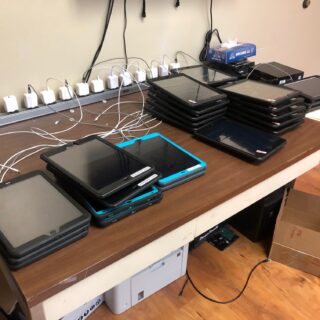IT works iPad magic
Over the past few weeks, the term “new normal” has been at the forefront of our lives. Creating a new way of living, working, and providing excellent mental health care, doesn’t just happen overnight. Thanks to the determination of our leadership team and the unsung heroes in our Information Technology (IT) department, the new normal is here and the people we serve are receiving excellent care and accessing services using agency iPads.
Green Country’s IT director, Mark Johnson, shares what it took to make it all happen in this Q&A session.
What was the process for creating this new normal for our clients?
Over the past few years, GCBHS has been successfully providing telehealth services to a limited number of existing clients, so we were very familiar with the telehealth process. GCBHS’s Pandemic Team took our basic telehealth service model and created a plan to provide service to a greater number of clients while addressing clients limited access to appropriate technology. We had to quickly assess both the clients ability to participate in telehealth and our ability to provide those clients with access if none was available. Our plan was to change an office based, face to face service delivery environment to a mobile one overnight. We gathered agency iPads, MyCare iPads, laptops and WiFi Hotspots in adequate amounts to be able to serve a great majority of our clients. We are utilizing telehealth software such as Doxy.me and MyCare to manage secure, HIPAA compliant, video connections for our clients and staff.
Who all was involved and who does it benefit?
The “Pandemic Posse” was responsible for creating a dynamic plan for addressing the health risks of providing safe and effective services to our clients and insuring staff safety during this COVID-19 pandemic……The team members include: Joy Sloan, Melissa Shofner, Leigh Combs, Cheryl Ridley, Carla Lovelady, Jennifer Tapia, Mark Johnson, Zach Vickers and Leticea Newton.
The Plan will certainly benefit new and existing clients by allowing them to receive service from their homes using an iPad, Smart Phone or other compatible device, or by driving to our agency and receive service while sitting in their vehicle with one of our agency provided iPads. It will also be beneficial to our clinical staff who
will be able to provide service to our clients from the safety and comfort of their own homes. Some staff will remain at the offices and will still provide telehealth services to our clients.

When did all this take place and where did all these iPads go?
We started this process in early March and there was no time to waste, it had to happen immediately! We are using iPads in patient homes and staff homes. We also use them here at the office to make remote calls for regularly scheduled appointments. In the past year we have been collaborating with the Muskogee Police Department, the Muskogee County Sheriff’s Department by giving them iPads for crisis calls.
Why was this important to get up and running so fast?
Our goal was to provide safe and effective service for our clients during this pandemic And here at GCBHS, our client’s and our staff’s safety comes first. Using the appropriate technology was the only thing that allowed us to accomplish that goal.
How will all this new technology affect how we operate in the future?
It feels like we have been preparing for the past couple of years. This pandemic has certainly changed the way we currently deliver services to our clients and may not be reversible. We have seen great success in this new service delivery model and I believe the Oklahoma Dept. of Mental Health, along with many other states, will adopt the most successful forms of service delivery happening now and incorporate them into a “new normal” service delivery system.
